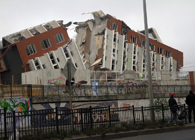
Devastating earthquakes seem like far off events, but leading BGS seismologist Roger Musson warns that, in Britain, we may not be as safe as we think we are. Sarah Day reports from the British Science Festival in Birmingham.
Geoscientist online, 16 September 2010
'For a start, an urban population is a more vulnerable population' says Musson. 'Even if the rate of earthquakes stays the same, the rate of earthquake disasters is likely to increase'.
Although Britain is far away from plate boundaries, protecting us from catastrophic earthquakes like that which hit Haiti, this doesn't mean that we aren't affected. Stress can build up in the centre of plates, released along lines of weakness such as the Great Glen Fault in Scotland which records the closure of the Iapetus Ocean. As a result of such stresses, earthquakes in Britain are surprisingly common.
'One of the strongest earthquakes to have affected Britain occurred on 6 April 1580', says Musson. 'The magnitude, estimated from the size of the area shaken, was about 5, and the epicentre was in the Dover Straits'.
Two people in London died as a result of the quake. 'Although it was some distance away, London was quite strongly affected, probably because the soft Thames clays are more susceptible to being shaken'.
As Musson points out, the effects of a similar event would be much greater today, with urban development far more advanced.
'Modern London has about 40 times as many people living in it. If the number of fatalities were to scale up with the population, while the next earthquake would not be a disaster on an international scale, it will come as an unpleasant shock for a country that tends to think of itself as immune from earthquakes'.
But how likely is such an event in the near future? Unfortunately, accurate prediction of earthquakes remains impossible. But whether a population retains a living memory of such events plays an important role - if not, then we could find ourselves caught out.
'Most people have no idea of the earthquake history of their country' Musson points out. 'They have no knowledge of past earthquakes beyond the scope of living memory. And the same issue of increased exposure to earthquakes applies just as much to Britain as to the rest of the world'.